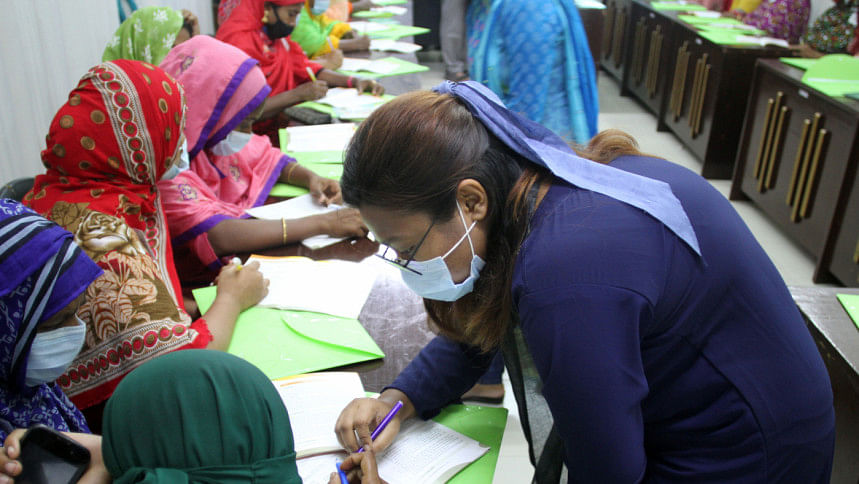Experiential learning in the ULAB MBA program helping women realise their leadership potential

Where gender stereotypes and biases persist, could an experiential MBA help women overcome challenges and achieve their career goals?
A good MBA program imparts more than just knowledge. It helps students to build a network, gain valuable leadership experience, and improve their confidence. According to Professor Imran Rahman, Vice-Chancellor at the University of Liberal Arts Bangladesh, these benefits are especially poignant for women. Professor Rahman, who is also the Dean of ULAB School of Business, thinks MBA programs could give women a boost in securing their fair share of influential positions.
It is often hard to grasp for the male-dominated corporate world that something as ostensibly simple as confidence may prove vital if women are to achieve true equality. This phenomenon is dubbed 'the confidence gap' by some researchers who believe it partly explains why women are underrepresented in positions of leadership. Because women are less likely to talk up their abilities, the theory goes, they're less likely to get noticed in the corporate world.
Undertaking an MBA could help women to narrow the 'gap'. It will push women to move outside their comfort zone and give them the confidence to be less modest and allow their talent to shine. Of course, low confidence is just one factor in a cultural milieu that holds women back from positions of power. The bias against women's progression is more of a systemic problem. What needs to change are the social views and attitudes in society that hold women back from taking leading roles in organizations of all types.
Despite this bias—or because of it—MBA programs offer a great space to design programs integrated with the MBA curriculum about gender inclusion. And that thought inspired the design of a program for gifted female MBA students that would push them to challenge their comfort zone and take their learning from a business school to work with rural women entrepreneurs in remote villages and explore ways they could learn from each other.
During the initial days of the Covid, WorldFish, a leading international NGO took an initiative titled "Post Covid-19 Eco-System Development for Bangladesh Aquaculture Activity participants" under the USAID funded Feed the Future program in Barguna and Patuakhali district. The idea was to help the rural women entrepreneurs, from the women-headed households, pivot their business model to cope with the crisis. The project wanted to use both resources and training to help them achieve production efficiency, reduce cost and develop new products to adjust to the changing market needs.
ULAB MBA program had been in discussion with ENLIVEN- a youth-led organization working in youth employability and entrepreneurship, to design a program that would give female MBA students without full-time work experience a chance to work with the rural enterprises in remote villages. The idea was to create an "MBA Field School" where MBA students could apply some of their theoretical learning and at the same time gain invaluable knowledge from the entrepreneurs who have been doing it on their own.
This initiative under the Bangladesh Aquaculture Activity to assist rural women entrepreneurs created a perfect opportunity. ULAB MBA program, ENLIVEN and BAA project of WorldFish designed a pilot initiative to create a partnership between female MBA students and rural women entrepreneurs. Ten female MBA students selected through a process went through a 2 week long virtual training of trainers (TOT) conducted by ENLIVEN during June 2020.
The training of the trainers was primarily designed to get the female students to conduct a three days long training program for the rural women entrepreneurs and provide business development services in the long run. However, a big part of the training also made attempts to help the female MBA students understand the field reality, the context of the rural women entrepreneurs and norms of working in a remote village.
Once the training was completed, 10 female MBA students divided into two groups, visited Barguna and Patuakhali region, to conduct a rapid need assessment and provide business development training to 60 female entrepreneurs in two districts. After the training, the MBA students had the opportunity to work with the rural women entrepreneurs to better understand their business model and challenges.
After they had returned, ENLIVEN and the female students from ULAB developed a pictorial business management handbook for the rural women entrepreneurs so that they could use it in the long run. The handbook was published recently and the Bangladesh Aquaculture Activity project plans to use it widely in helping rural women entrepreneurs.
"Rural women have more confidence in their ability that we often lack. They seem to be ready to face any obstacles in their lives. They are extremely innovative and resilient. And my biggest learning working with them has not been in the field of business but in the areas of my own personal development. I came back from the trip with a sense of gratitude for everything that I have but also with a determination to create an impact in my life and in the community," says Falguni Rahman, a final term MBA student while sharing her experience.
For ULAB, the program has created a new frontier in making business education inclusive and relevant. The stakeholders are in discussion to expand the program for 1200 female students over the next few years.
Looking at the future, Professor Imran Rahman Vice Chancellor of ULAB, observes "An MBA remains an excellent medium for talented women to both gain further management and leadership insight while providing proof of their undeniable abilities,"

 For all latest news, follow The Daily Star's Google News channel.
For all latest news, follow The Daily Star's Google News channel. 



Comments